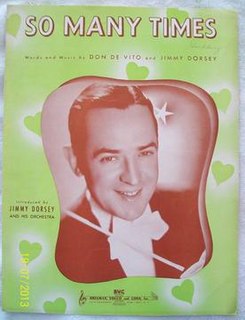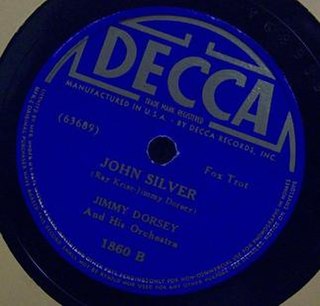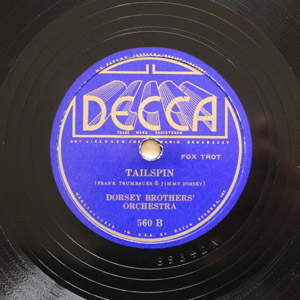
Thomas Francis Dorsey Jr. was an American jazz trombonist, composer, conductor and bandleader of the big band era. He was known as the "Sentimental Gentleman of Swing" because of his smooth-toned trombone playing. His technical skill on the trombone gave him renown among other musicians. He was the younger brother of bandleader Jimmy Dorsey. After Dorsey broke with his brother in the mid-1930s, he led an extremely popular and highly successful band from the late 1930s into the 1950s. He is best remembered for standards such as "Opus One", "Song of India", "Marie", "On Treasure Island", and his biggest hit single, "I'll Never Smile Again".

Roland Bernard "Bunny" Berigan was an American jazz trumpeter and bandleader who rose to fame during the swing era, but whose career and influence were shortened by alcoholism and ended with his early death at age 33 from cirrhosis. Although he composed some jazz instrumentals such as "Chicken and Waffles" and "Blues", Berigan was best known for his virtuoso jazz trumpeting. His 1937 classic recording "I Can't Get Started" was inducted into the Grammy Hall of Fame in 1975.
Joseph Anthony (Fud) Livingston was an American jazz clarinetist, saxophonist, arranger, and composer. He co-wrote the jazz and pop standard "I'm Thru With Love".

"Riverboat Shuffle" is a popular song composed by Hoagy Carmichael, Irving Mills and Dick Voynow, and with lyrics added later by Carmichael and Mitchell Parish. First recorded by Bix Beiderbecke and The Wolverines in 1924, it was Carmichael's first composition and would become a Dixieland standard. The Wolverines released the song as a Gennet 78, 5454-A, Matrix #11854 524, in 1924. Bix Beiderbecke recorded a second version of the song in 1927 with Frankie Trumbauer and His Orchestra which was released as an Okeh 78, 40822. Carmichael would later write many popular jazz standards, including "Stardust" (1929), "Georgia on My Mind" (1930) and "Lazy River" (1931).

"I'm Glad There Is You " is a song written by Jimmy Dorsey and Paul Madeira first published in 1941. It has become a jazz and pop standard.

Annie's Cousin Fannie, which is sometimes listed as "Annie's Cousin Fanny", is a 1934 song composed by Glenn Miller and recorded by The Dorsey Brothers Orchestra for Brunswick and Decca Records. The Dorsey Brothers released two versions of the song in 1934 and 1935.

"It's the Dreamer in Me" is a 1938 song composed by Jimmy Dorsey and Jimmy Van Heusen, which was first recorded by Jimmy Dorsey and His Orchestra with Bob Eberly on vocals. Jimmy Dorsey composed the music. The lyrics were written by Jimmy Van Heusen. The song is a jazz and pop standard.

Dese Dem Dose is a 1935 instrumental composed by Glenn Miller and recorded by The Dorsey Brothers orchestra.

"In The Middle Of A Dream" is a 1939 song composed by Tommy Dorsey, Einar Swan, and Al Stillman. The song became a Top Ten hit in 1939 when released by Tommy Dorsey and His Orchestra.

So Many Times is a 1939 song written by Jimmy Dorsey and Don De Vito. The song was released as a single in 1939 by Jimmy Dorsey and His Orchestra, becoming a Top 20 hit.

John Silver is a 1938 song written by Jimmy Dorsey with Ray Krise. Jimmy Dorsey and His Orchestra released the song as a 78 single on Decca in 1938.

"Tomorrow's Another Day" is a 1935 song composed by Glenn Miller for the Dorsey Brothers Orchestra. The song was released as a 78 single by the Dorsey Brothers Orchestra on Decca Records.

"Harlem Chapel Chimes" is a 1935 jazz instrumental composed by Glenn Miller. The song was released as an A-side 78 single by the Dorsey Brothers Orchestra.
"Sweet Sue, Just You" is an American popular song of 1928, composed by Victor Young with lyrics by Will J. Harris. Popular versions in 1928 were by Earl Burtnett and by Ben Pollack.

"Singin' the Blues" is a 1920 jazz composition by J. Russel Robinson, Con Conrad, Sam M. Lewis, and Joe Young. It was recorded by the Original Dixieland Jass Band in 1920 as an instrumental and released as a Victor 78 as part of a medley with "Margie". The song was released with lyrics by vocalist Aileen Stanley in 1920 on Victor. In 1927, Frank Trumbauer, Bix Beiderbecke, and Eddie Lang recorded and released the song as an Okeh 78. The Trumbauer recording is considered a jazz and pop standard, greatly contributing to Frank Trumbauer and Bix Beiderbecke's reputation and influence. It is not related to the 1956 pop song "Singing the Blues" first recorded and released by Marty Robbins in 1956.

Ostrich Walk" is a 1917 jazz composition by the Original Dixieland Jass Band released as an instrumental as an Aeolian Vocalion and a Victor 78. Frankie Trumbauer and Bix Beiderbecke recorded the song in 1927. The song is a jazz milestone as one of the first commercially released "jass" or jazz recordings.
William H. "Bill" Challis was an American jazz arranger, best known for his association with the Paul Whiteman orchestra.


















